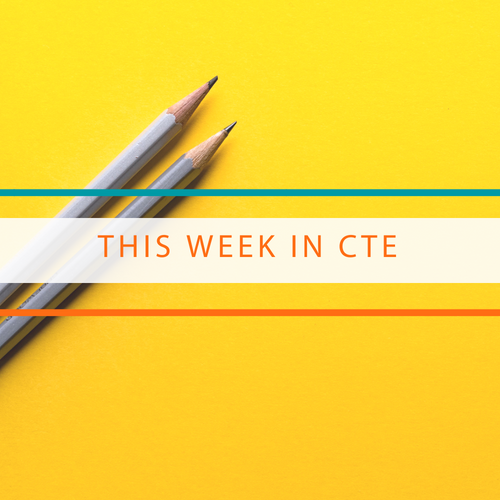 Developed with input from nearly 200 national, state and local education and workforce development leaders and supported by 40 national organizations, Without Limits: A Shared Vision for the Future of Career Technical Education lays out five inter-connected and equally critical principles.
Developed with input from nearly 200 national, state and local education and workforce development leaders and supported by 40 national organizations, Without Limits: A Shared Vision for the Future of Career Technical Education lays out five inter-connected and equally critical principles.
Only through shared commitment and shared ownership among leaders and practitioners at all levels can we realize the possibility and aspiration of a new career preparation ecosystem that provides each learner with limitless opportunity. The This Week in CTE blog series will highlight state and local examples where CTE Without Limits has been made actionable. If you would like to share how your CTE program creates limitless opportunities for each learner in this blog series, please email Brittany Cannady, [email protected].
This Week in CTE: May 10 – 14, 2021
Each learner engages in a cohesive, flexible, and responsive career preparation ecosystem
This week we extend congratulations to the 57th class of U.S. Presidential Scholars! Of the 161 high school seniors selected, 20 outstanding learners from CTE programs have been awarded this honor for their accomplishments. The 2021 class of U.S. Presidential Scholars in CTE represent the following states: Arizona, Delaware, Florida, Iowa, Maryland, Massachusetts, Michigan, Missouri, Pennsylvania, Puerto Rico, Texas, Utah, Washington, West Virginia and Wisconsin.
A full press release can be found here.
Each learner feels welcome in, is supported by, and has the means to succeed in the career preparation ecosystem
This week career tech centers in Ohio received a visit from Lieutenant Governor Jon Husted, who serves as the Director of the Governor’s Office of Workforce Transformation. During the site visits, learners shared reasons for participating in career pathways and early postsecondary opportunities (EPSOs).
Reflecting on his visits Lt. Gov. Husted stated, “We have to have more students who are taking their career seriously at an earlier age, gaining some real world experience, preparing for work, earning college credits without having to run a bunch of debt, and make the education affordable and effective.”
Read more from learners and about the career tech site visits in this article published by Dayton Daily News.
#CareerTech @LtGovHusted visits @MVCTC & highlights the importance of thinking about career early, gaining experience and earning credits without taking on debt @OhioOWT https://t.co/2iYmedtIbO
— Ohio Higher Ed (@OhioHigherEd) May 12, 2021
Each learner skillfully navigates their own career journey
“Some students are already working in the field part time…students who are skilled in masonry will always be able to find work because of demand.”- Holly Pore, District Career Technical Education Director, Rowan-Salisbury Schools.
North Carolina CTE students competed this past week at Skills Rowan, a skills-based competition where Rowan-Salisbury schools showcase their industry skills. Despite the challenges due to the pandemic in hosting a competition that mimics years past, students were still able to feel value from competing and receiving the opportunity to be the true navigator of their career journey.
Read more in this article published by the Salisbury Post.
Each learner’s skills are counted, valued, and portable
Advance CTE’s newly released communications research indicates that learners who participate in CTE are more prepared for and more likely to plan to complete college. When states build more cohesive systems where early EPSOs such as dual enrollment are fully counted, valued and portable, learners have more equitable paths to college and career success.
Intentional Acts of Dual Enrollment: State Strategies for Scaling Early Postsecondary Opportunities in Career Pathways provides the following four key strategies to achieve this goal and highlights effective programs in Ohio, Tennessee and Utah:
- Advancing buy-in and systems alignment through institutional partnerships;
- Building robust and streamlined state policy that builds EPSOs into career pathways;
- Funding EPSOs on the margins through state incentives to remove financial barriers for learners; and
- Prioritizing equity and removing burdensome admissions and administrative barriers to participation.
View this brief and other New Skills ready network resources here.
Each learner can access CTE without borders
Learners with a career interest in agriculture can register to attend a free virtual internship experience with industry professionals. Do you need career experiences for students despite the pandemic? Attendees will learn:
- How to pursue jobs in agriculture and more;
- How to sustainably source and deliver a variety of meat and seafood to peoples’ homes; and
- How to add seaweed to cattle’s diet to reduce methane emissions.
Educators should attend with learners to explore agricultural jobs and practice asking questions live!
Date: Thursday, May 20
Time: 12:30 pm ET/9:30 am PT.
Register here.
Brittany Cannady, Senior Associate Digital Media
